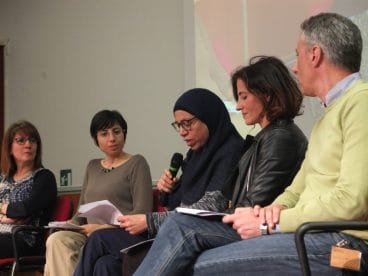
Photo: Rosario De Rosa
historically the youngest of the peninsula, built during the Fascist period on the reclaimed land of the Agro Pontino. Its population is of “mixed” origin, with people from various regional backgrounds, now enriched by a greater cultural diversity as a result of immigration.
Basma moved here 18 years ago, together with her husband Ben, both from Tunisia. Their two children were born in Italy. “One day,” Basma recounts, “as I waited for my youngest child outside the school, I became acquainted with an Italian mother, and little by little we built a profound friendship. Up until then, I knew a number of Christians, or at least that’s what they claimed to be, but they gave me a fairly negative impression of Christianity, where everything was permitted and you could not see the difference between good and evil. However, together with this newfound Christian friend, we discussed our faith and beliefs and we discovered that we had much in common: each of us had put God at the centre of their life. She always offered me a ride after school since she lived nearby and soon our families started seeing a lot of each other. I discovered that behind this new friend was a group of people, all Christians, living for God.” The friendship grew, by simply exchanging gifts and having mutual appreciation: such as couscous dinners served in Tunisian dishes for the whole family. “We crossed the city together on foot, as we usually do, and they remarked that they had discovered a hidden city, populated by many Muslim friends.” Then we organised a Tunisian evening with free entrance to support the school fees of the children, in a period when the father had had an accident at work. Our Christian friends furnished the house with traditional rugs, curtains, pillows, low tables and candles. “We went shopping together and Basma cooked for us,” they said. There was such much joy when the right amount of money arrived for the purchase of school books. It was a wonderful night in which we could express our Arabic culture and we all felt we were brothers and sisters. In presenting the cheque, the note said: “Thank you for taking us into a journey into your own land. Your family from Latina.” Basma’s weeping sealed the bond between us all. ”

Foto: Rosario De Rosa
Then, suddenly, came the illness and death of her husband. “Before leaving Ben entrusted me to these Christian friends. I for one was so surprised: there were his family, the brothers at the Mosque, but perhaps he felt that with his Christian friends there was a relationship based on God. Ben died leaving us in deep sorrow. We were alone in a foreign land. I did not have the strength to live,” confided Basma. In those days marked by profound grief, her Christian friends started to take turns in looking after the family, preparing meals and trying to encourage them to keep going. “Her pain and that of her children was ours,” they recounted. They launched a big communion of goods in order to support them. Soon after, they received ten sackfuls of vegetables. This type of “providence”, as her Christian friends called it, became contagious, and even Basma herself started to share what she received. Eventually, she was offered a job. But the shift at the factory started at four in the morning and it was far from her home. One of her friends offered to accompany her. This action started a chain of initiatives in order to share her burden and to to give her encouragement. “In this new work environment,” says Basma, “I have also started to love everyone, including those who considered me an enemy because I wear a veil. Now there is such a beautiful rapport with these colleagues that they offered to give me a lift to work, so my friends don’t have to accompany me any more. In the early days, when it was difficult, I repeated a phrase I had heard from my fellow Christians:
‘Where there is no love, put love and you will find love’. It’s so true; love is contagious.”
Maria Chiara De Lorenzo
0 Comments